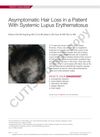TLDR Terbinafine can cause hair loss.
The document discussed a case of hair loss following terbinafine treatment, reported by the Dermatology Department at the University of Liège. The authors, B. Richert, I. Uhoda, and M. De La Brassinne, highlighted that while terbinafine is commonly used for fungal infections, it can have adverse effects, including hair loss. The report emphasized the need for clinicians to be aware of this potential side effect when prescribing terbinafine.
63 citations
,
September 1995 in “Annals of internal medicine” Fluconazole can cause temporary hair loss, which stops after reducing or stopping the drug.
 72 citations
,
June 2013 in “Journal of feline medicine and surgery”
72 citations
,
June 2013 in “Journal of feline medicine and surgery” The document says to treat cat fungal infections with medicine and clean the environment, noting that cats without symptoms can still spread it to humans.
 55 citations
,
May 2014 in “Journal of feline medicine and surgery”
55 citations
,
May 2014 in “Journal of feline medicine and surgery” Combining systemic and topical treatments, guided by weekly fungal cultures, effectively treats cat ringworm.

Fungal infections can cause hair loss in lupus patients and should be considered even if rare.
 33 citations
,
February 1996 in “Journal of The American Academy of Dermatology”
33 citations
,
February 1996 in “Journal of The American Academy of Dermatology” Treat scalp and beard fungal infections early with oral antifungal medication and sometimes topical therapy, avoiding unnecessary allergy tests and surgery.
August 2025 in “Biomedicines” Half-siblings with a rare skin condition improved with treatment for a fungal infection, but hair loss remained.




